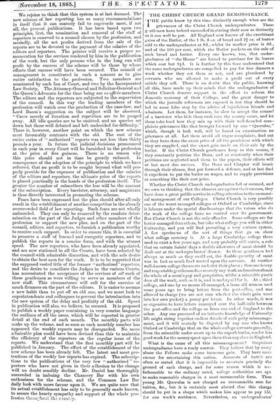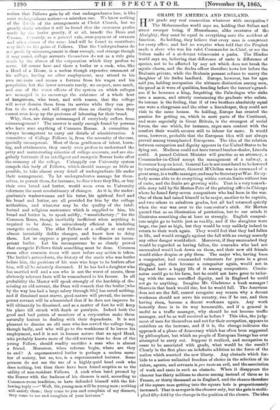We rejoice to think that this system is at last
doomed. The THE CHRIST CHURCH GRAND REMONSTRANCE.
'11HE public know by this time distinctly enough what are the
publications. It has been based upon two grievances of the Christ Church undergraduates. These
all, the present they are supplied, and the exact gain made on their sale by the butler. If the Christ Church gentlemen keep to this course, if they constantly petition the Dean, and as constantly when their consequence of the adoption of the principle to, which we have petitions are neglected send them to the papers, their efforts will
referred, that no profit is to be sought beyond what will pro- at last meet due success. The Dean and Chapter will break perly provide for the expenses of publication and the salaries through their silence, first put forward a defence, and at last find of the editors and reporters, the ultimate price of the reports it expedient to put the butler on wages, and to supply provisions is placed practically in the hands of the profession itself. The at something like their cost price.
greater the number of subscribers the less will be the amount Whether the Christ Church undergraduates fail or succeed, and of the subscription. Every barrister, attorney, and magistrate we own to thinking that the chances are against their success, they is thus directly interested in promoting the scheme. have done a great public service in calling attention to the economi-
Fears have been expressed lest the plan should after all only cal management of our Colleges. Christ Church is very possibly result in the establishment of another competitor in the already one of the worst managed colleges at Oxford or Cambridge, since overcrowded field of law reporting. Such fears are not wholly it labours under the special disadvantage that the tutors who do unfounded. They can only be removed by the resolute deter- the work of the college have no control over its government. mination on the part of the Judges and other members of the But Christ Church is not the only offender. Some colleges are far profession to support the new plan, and on the part of the better managed than others, but take what college you will in either council, editors, and reporters, to furnish a publication worthy University, and you will find prevailing a very curious system. to receive such support. In order .to ensure this, it is essential A few specimens of the sort of things that go on show to preserve a staff of learned and energetic reporters, and to what college economy is. At a large Cambridge college there publish the reports in a concise form, and with the utmost used to exist a few years ago, and very probably still exists, a rule speed. The new reporters, who have been already appointed, that on certain Saints' days a double allowance of meat should be and are now stationed in all the Courts, have been selected by dealt out at the undergraduates' dinner. As these gentlemen had
the council with admirable discretion, and with the sole desire
always as much as they could eat, the double quantity of meat
to obtain the best men for the work. It is to be regretted that w
the supposed vested title of the former "authorized" reporters, as in fact so much food wasted upon the servants. At another and the desire to conciliate the Judges in the various Courts, well-known college the scouts underlet their places ; thus one heavy
and respoctable gentleman does scarcely any work and receives almost these gentlemen as were willing to serve as members of the the whole of a scout's pay and perquisites, whilst a miserable youth notion that Fellows gain by all that undergraduates lose, is like most undergraduate notions—a mistaken one. We know nothing of the details of the arrangements at Christ Church, but we greatly doubt whether it will be found that the enormous profits made by the butler greatly, if at all, benefit the Dean and 'Canons. Certainly, as a general rule, over-payment of servants and oth.-r abuses of the same kind will be found to contribute very little to the gains of Fellows. That the Undergraduates do not profit by mismanagement is clear enough, and strange though it may sound, college servants themselves do not as a rule gain much by the abuses of the corporation which they profess to serve. Of course here and there a butler or a cook, who, like a Head of a House, is a useless though expensive ornament of his college, having no other employment, may attend to his own interests and amass a fortune from his wages and his ,perquisites, but the lower servants rarely, we suspect, save much, and one of the worst effects of the system on which colleges are managed is to encourage the existence of a whole host of hangers-on, who trust, and with reason, that the college will never dismiss them from its service while they can pro- fess to do work, and will support them on charity when they cannot even keep up the pretence of labouring for their bread. Why, then, are things mismanaged if everybody suffers from mismanagement ? The answer is easily enough found by persons who have seen anything of Common Rooms. A committee is always incompetent to carry out details of administration. A committee of College Fellows is, from the necessity of the case, specially incompetent. Most of them gentlemen of talent, learn- ing, and attainments, they rarely even profess to understand the petty and uninteresting minutiae of college accounts, and are sin- gularly fortunate if an intelligent and energetic Bursar looks after the economy of the college. Unhappily our University system compels this body of Fellows, which should manage as little as possible, to take almost every detail of undergraduate life under their management. To let undergraduates manage for them- selves, to permit them, for instance, to dine where they like, or buy their own bread and butter, would seem even to University reformers the most revolutionary of changes. As it is, the under- graduate's washerwoman and his tutor, his spiritual food and his bread and butter, are all provided for him by the college authorities, and whatever may be the quality of the intel- lectual and religious sustenance which is supplied to him, his bread and butter is, to speak mildly, " unsatisfactory ;" for the Common Room, though inevitably inefficient when anything is required to be done, is miraculously efficient in hindering energetic action. The elder Fellows of a college at any rate almost invariably dislike changes, and know how to delay them. Let us suppose a proposal made to dismiss an incom- petent butler. Let his incompetence be so clearly proved that energetic Fellows think something must be done. Common room after common room will meet before any action is taken. The butler's antecedents, the history of the uncle who was butler before him, the positions of his sons who hope to be butlers after him, will all be minutely discussed. If he has had a daughter who has married well and a son who is not the worst of scouts, these obviously relevant facts will be remembered in his favour. In all probability the Master will speak strongly of the hardship of dis- missing an old servant, the Dean will remark that the butler [who by the way has had a large salary through life] has saved nothing, and if dismissed must starve, good-nature will prevail, the incom- petent servant will be admonished that if he does not improve he will ultimately be dismissed, and as a matter of fact he will keep his place till struck with death or paralysis. Indeed both the good and bad points of members of a corporation make them naturally lenient in dealing with their dependents. It is not pleasant to dismiss an old man who has served the college long, though badly, and who will go to the workhouse if he leaves his employment, and it is not in human nature that an aged Head, who probably knows more of the old servant than he does of the young Fellow, should readily sacrifice a man who is almost a friend. Moreover, when reforms begin, where are they to end? A superannuated butler is perhaps a useless mem- ber of society, but so, too, is a superannuated lecturer. Some persons do not see the use of a highly-paid head cook who does nothing, but then there have been found sceptics as to the utility of non-resident Fellows. A cook when hard pressed by the Bursar with the badness of his dinners is said, according to Common-room tradition, to have defended himself with the fol- lowing reply :—" Well, Sir, young men will be young men ; nothing will satisfy them ; they come to you and complain of my dinners, they come to me and complain of your lectures."































 Previous page
Previous page